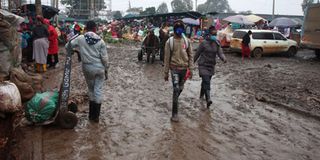It's rainy, muddy Covid-19 times

People walking in a muddy Muthurwa Market in Nairobi on September 08, 2020.
What you need to know:
- The upper-deck folks have the pricier facemasks, light and easier to breathe through. They are properly covered.
- The masses have the cheaper ones, heavier, and a little burdensome for breathing through.
- Now it’s raining again, and unusually chilly for this time of the year.
We live at the far edge of Nairobi’s Westlands constituency, where, after a few minutes of brisk walking and even fewer of running, you are in Kiambu, Kenya’s second-most populous county — and the one that’s gentrifying the fastest.
We are a mixed bunch, with both Kenya’s most well-heeled and the masses. On voting day, if you drive around, you see upper-deck people, looking like they are going to watch a tennis match at Wimbledon – in pastel colours, wide brimmed sun hats, designer sunglasses and fans. And the masses are plentiful, uncovered, unbowed, braving the sun, exercising their democratic rights.
All these classes were in Covid-19 lockdown prison but in recent weeks, as the restrictions are lifted, they are emerging. You can tell them by their masks. The upper-deck folks have the pricier facemasks, light and easier to breathe through. They are properly covered.
The masses have the cheaper ones, heavier, and a little burdensome for breathing through. Thus, when they are about working, sweeping the streets, or walking with heavy luggage on their heads, they wear them on the chin so they can breathe easier during the exertion. There has been a lot of mocking of people who wear face masks on the chin or “like a necklace” – there’s an irritating class blindness to it all.
Now it’s raining again, and unusually chilly for this time of the year. On a trudge during a drizzly morning, I find myself in Kiambu. It was also muddy, so you’d expect there wouldn’t be many people about. But there were. And they were mostly women, likely coming from or going to a workplace. In muddy gumboots, they walk in groups of five or six.
There are also the middle-aged and elderly Kenyan workhorses, the women who carry heavy luggage, slung over their foreheads and balanced on their backs. Some years ago, with other blokes, we hiked for days to Limuru, towards Naivasha, and back during a long holiday. We ran into rain along Limuru Road, and with soaked backpacks that had become heavy, struggled badly to climb up hills.
At one point, a group of elderly women came from behind, with mounds of firewood slung across their foreheads, and breezed past us. We were both humbled and humiliated. Over the days of the journey, we were to meet dozens more people carrying heavy things this way. Not one of them was a man. I couldn’t get over it.
Wade through the mud
Days later, at the office at Nation Centre, I told a good friend about it, and asked: “Do Kenyan men in the villages really work?”
He laughed, and literally ran away.
The story is different in the city, of course. The women wade through the mud, but they are not alone. The ‘knock, knock’ sounds at the construction sites don’t stop. The men are at it. They talk politics, make dirty jokes and laugh loudly. I see women, drenched, carrying baskets and bags, branching into the sites. They are going to sell food to them.
On this day though, the signs of the toll that Covid-19 has taken on the informal sector and small-scale industries are evident. I have seen similar scenes in photographs and television reports out of Nigeria, South Africa and several other countries.
Although it’s drizzling, along the roads there are groups of young men, some with their tools, sitting, waiting for someone to drive along and hire them for casual work. This used to happen pre-coronavirus too; it’s just that now their numbers are several times larger.
Friends have told me of a similar picture all around the city. Times are hard; they couldn’t afford to take cover from the rain. I pass near one of the groups. The rancid odour from their woollen caps and damp clothes is very strong. I noticed none of them had capped a cigarette in their hand, to keep warm, as they normally would. Maybe, they can’t afford the habit anymore.
There is an ambassador up the road in our neighbourhood. On many days, distressed people (mostly women and children) gather outside his gate to get small hampers of charity food. On this day as I return, maybe because of the weather, the place is silent.
Then there is a guy, in his turban, who packs quarter loaves of bread in his car, and hands them out as he drives to the needy who catch his eye. He warms my heart. I missed seeing him. There is an old woman, she was regular with her exercises, and sometimes picked up discarded plastic and other annoying litter. I haven’t seen her in a while. I hope she is well.
And there’s an old man. He walks, stooped. Sometimes he wears his face mask fully. Sometimes he wears it on his chin, especially when he’s pensive. Sometimes we wave. Sometimes we don’t.
He was sitting on a cement edge under a tree, sheltering from the drizzle. His face mask was on his chin. He didn’t look up. We didn’t wave. He looked really lonely this time.
Mr Onyango-Obbo is a journalist, writer and curator of the Wall of Great Africans. @cobbo3





